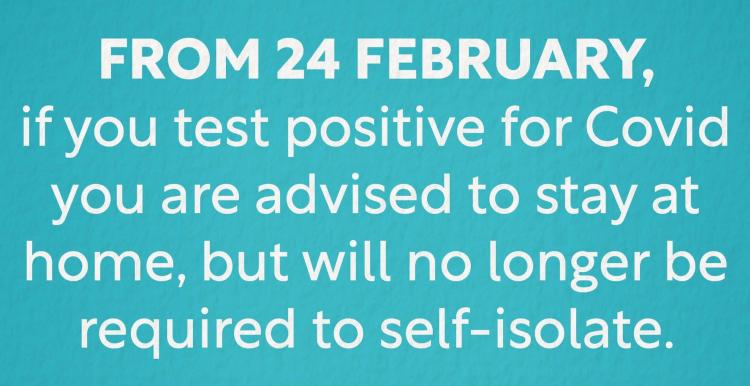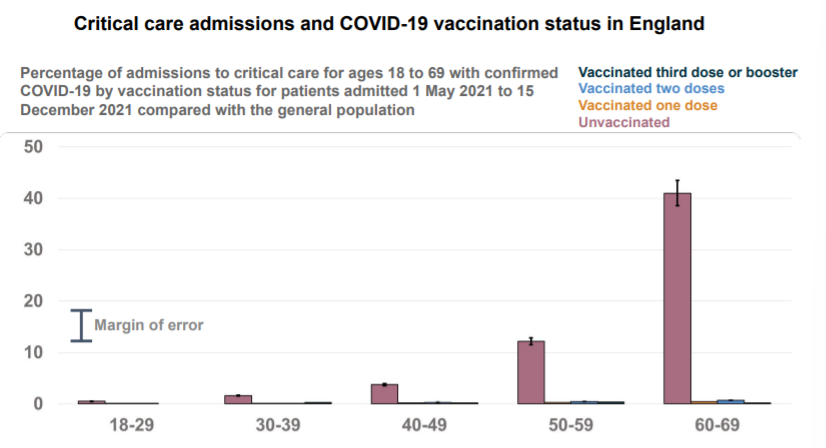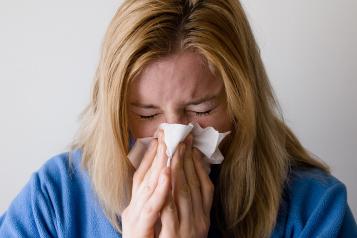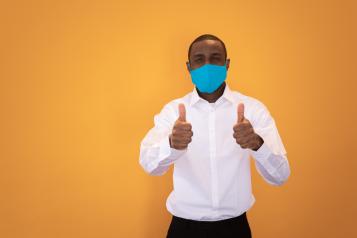Living with Covid-19: lifting of restrictions

Timeline of changes
From 21 February the Government is
Removing the guidance for staff and students in most education and childcare settings to undertake twice weekly asymptomatic testing.
From 24 February the Government will
● Remove the legal requirement to self-isolate following a positive test. Adults and children who test positive will continue to be advised to stay at home and avoid contact with other people. After 5 days, they may choose to take a Lateral Flow Test followed by another the next day - if both are negative, and they do not have a temperature, they can safely return to their normal routine. Those who test positive should avoid contact with anyone in an at risk group, including if they live in the same household. There will be specific guidance for staff in particularly vulnerable services, such as adult social care, healthcare, and prisons and places of detention.
● No longer ask fully vaccinated close contacts and those aged under 18 to test daily for 7 days, and remove the legal requirement for close contacts who are not fully vaccinated to self-isolate.
● End self-isolation support payments, national funding for practical support and the medicine delivery service will no longer be available. People who were instructed to self-isolate before this date will still be able to claim support payments within the next 42 days.
● End routine contact tracing. Contacts will no longer be required to self-isolate or advised to take daily tests. Guidance will set out the precautions that contacts are advised to take to reduce risk to others.
● End the legal obligation for individuals to tell their employers when they are required to self-isolate.
● Revoke The Health Protection (Coronavirus, Restrictions) (England) (No. 3) Regulations.
How to stay safe
The majority of people previously considered clinically extremely vulnerable are now advised to follow the same general guidance as everyone else as a result of the protection they have received from vaccination.
Individuals can still reduce the risk of catching and passing on COVID-19 by:
a. Getting vaccinated; For people who have yet to take up their initial vaccine offer, the NHS continues to make vaccines available across the UK to ensure that every eligible person who wants a vaccine can get one.

Vaccination is the best way to protect yourself from severe Covid-19
b. Letting fresh air in if meeting indoors, or meeting outside;
c. Wearing a face covering in crowded and enclosed spaces, especially where you come into contact with people you do not usually meet, when rates of transmission are high;
d. Trying to stay at home if you are unwell;
e. Taking a test if you have COVID-19 symptoms, and staying at home and avoiding contact with other people if you test positive;
f. Washing your hands and following advice to ‘Catch it, Bin it, Kill it’.
From 24 March, the Government will
Remove the COVID-19 provisions within the Statutory Sick Pay and Employment and Support Allowance regulations. People with COVID-19 may still be eligible, subject to the normal conditions of entitlement.
From 1 April, the Government will
● No longer provide free universal symptomatic and asymptomatic testing for the general public in England. There will be some ongoing symptomatic free testing for a small number of at-risk groups (the Government will set out further details on which groups will be eligible) and for social care staff. Tests will be available for purchase at retailers and pharmacies.
● Update guidance setting out the ongoing steps that people with COVID-19 should take to minimise contact with other people. This will align with the changes to testing.
● Remove the current guidance on voluntary COVID-status certification in domestic settings and no longer recommend that certain venues use the NHS COVID Pass.
● Consolidate guidance to the public and businesses, in line with public health advice.
● Remove the health and safety requirement for every employer to explicitly consider COVID-19 in their risk assessments.
● Replace the existing set of ‘Working Safely’ guidance with new public health guidance.


